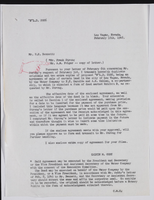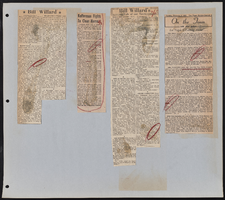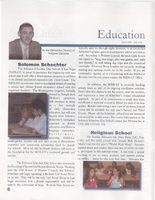Search the Special Collections and Archives Portal
Search Results
Fanny's Dress Shop Photographs
Identifier
Abstract
The Fanny’s Dress Shop Photographs (1930-1982) show one of Las Vegas’ premier women’s clothing stores. The collection includes images of Fanny Soss’ shop on Fremont Street, her store in the Flamingo Hotel, and Helldorado parades. Images include shop window displays.
Archival Collection
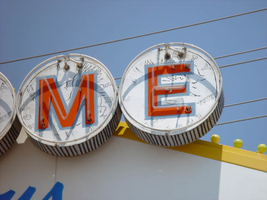
Photographs of Welcome to Fabulous Las Vegas sign, Las Vegas (Nev.), 2002
Date
Archival Collection
Description
Site name: Welcome to Las Vegas neon sign
Site address: 5200 S Las Vegas Blvd
Sign owner: YESCO
Sign details: The sign sits as a welcome to travelers entering the Las Vegas experience via Las Vegas Blvd The sign itself resides in the middle of traffic median directly in the middle of the road.
Sign condition: Structure 5 Surface 5 Lighting 5
Sign form: Pylon
Sign-specific description: The sign itself is a classic roadside pole design which faces North/South. It is double backed, internally lit with a border of yellow incandescent bulbs along the flat edge of its width. Across the top of the sign seven white neon circles house separate red neon letters which form the word welcome. Crowning the sign at the very peak, above the word welcome, is a seven pointed neon star comprised of orange and yellow neon. The cabinet itself is faced with translucent white plastic and treated with blue and red painted text. The South side of the sign reads with the Neon welcome word then in blue painted text "To Fabulous" in a 50's style text reminiscent of that used in the Last Frontier property, and cursive. The Words "Las Vegas" are spelled in all caps, in red block text. And below that in smaller blue text the word "Nevada" are spelled in all caps block text.
Sign - type of display: Neon; Incandescent; Backlit
Sign - media: Steel; Plastic
Sign - non-neon treatments: Graphics; Paint
Sign animation: chasing, flashing
Sign environment: The famous Welcome to Las Vegas sign sits alone at the South end of the strip and is often the very first sign a traveler encounters when entering the strip. It casts a surprisingly powerful glow over the barren median which it stands. It stands as a gateway to the extravaganza that is Las Vegas. When leaving the main drag headed south the sign has an equal effect of being a lone gateway in and out of the Strip.
Sign manufacturer: YESCO
Sign designer: Betty Willis
Sign - date of installation: 1959
Sign - thematic influences: Although it has no specific theme, it is from a specific period in Las Vegas History. It is the quintessential roadside pylon design. With an exposed steel center pole double backed marquee it is reminiscent of the common design of the roadside motor inn.
Sign - artistic significance: This sign has become perhaps the most copied icon of Las Vegas, as it was never copyrighted. It is a ubiquitous symbol of the city.
Surveyor: Joshua Cannaday
Survey - date completed: 2002
Sign keywords: Chasing; Flashing; Pylon; Neon; Incandescent; Backlit; Steel; Plastic; Paint; Graphics
Mixed Content

Transcript of interview with Morris "Moe" Dalitz by Brenda Baxter, November 4, 1977-March 30, 1978
Date
Description
Interview with Morris "Moe" Dalitz by Brenda Baxter, on several dates in late 1977 to early 1978. In this interview, Dalitz talks about his business and career endeavors before coming to Las Vegas, which included a laundry service and military service. Dalitz partnered with Wilbur Clark and became a successful hotel and casino owner in Las Vegas, as well as a real estate developer with properties including the Boulevard Mall and Sunrise Hospital.
Moe Dalitz was born in Boston in 1899, and soon after his family moved to Detroit, Michigan and where his father started a linen supply company. In 1930, during Prohibition, Moe moved to Cleveland, Ohio and he became involved with the then-illegal liquor business. At the age of 41, Dalitz enlisted in the Army and was stationed at Governors Island. Moe was put in charge of laundries and dry cleaning because of his experience in the laundry business. He played an important role in creating mobile laundry units that were used in the front lines in North Africa. His ingenuity won him a non-combatant award for his "unusual interest, ingenuity and talents" applied during his service. At the end of war, Moe returned to Cleveland, where his partners were successfully carrying on their business. It was then that they decided to go into the casino-nightclub business, opening nightclubs in Ohio and Kentucky. A couple years later, Moe and his partners met Wilbur Clark and agreed to finance his inactive project in Las Vegas. Thus, in 1950, the Desert Inn Hotel and Casino opened, and Moe Dalitz ushered in a new era for the city. Moe and partners continued to elevate the sophistication of the Strip when they acquired the operating lease to, and later part ownership of, the Stardust Hotel and Casino. Moe was instrumental in bringing the French Lido de Paris show to the Stardust, which was considered the most spectacular nightclub show produced in Las Vegas at its time. In addition to his gaming industry ventures, Moe engaged in significant real estate development, along with partners Allard Roen, Merv Adelson and Irwin Molasky. Their projects included Sunrise Hospital, The Boulevard Mall and Las Vegas Country Club as well as La Costa Resort and Spa in California. At the time of the interview, Moe was involved with the construction of a downtown hotel and casino. Moe Dalitz was the recipient of the Humanitarian Award from the American Cancer Research Center, and supported the Variety Club and the Home of the Good Shepard, amongst other charities.
Text

Transcript of interview with Gus Mancuso by Lisa Gioia-Acres, September 27, 2008
Date
Archival Collection
Description
Text
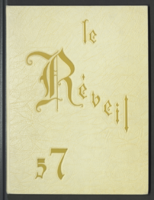
Le Reveil: Nevada Southern University Yearbook, 1957
Date
Description
Yearbook main highlights: schools and departments; detailed lists with names and headshots of faculty, administration and students; variety of photos from activities, festivals, campus life, and buildings; campus organizations such as sororities, fraternities and councils; beauty contest winners; college sports and featured athletes; and printed advertisements of local businesses; Institution name: Nevada Southern University, Las Vegas, NV
Mixed Content

